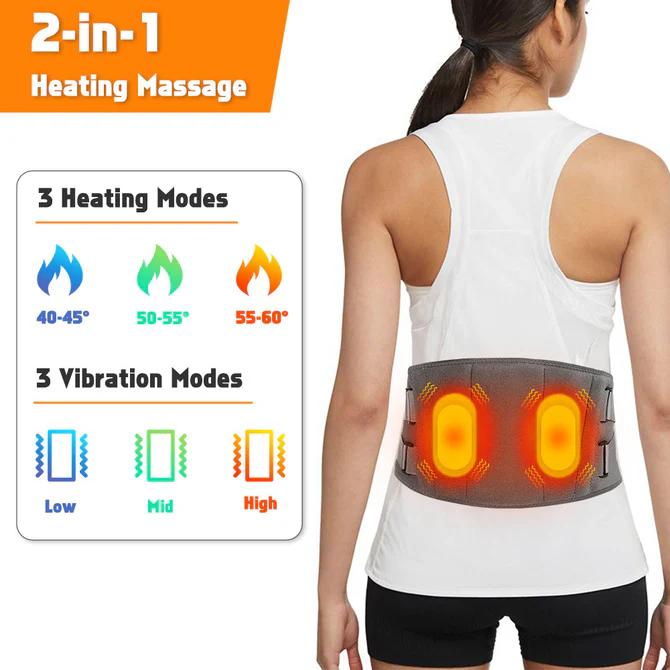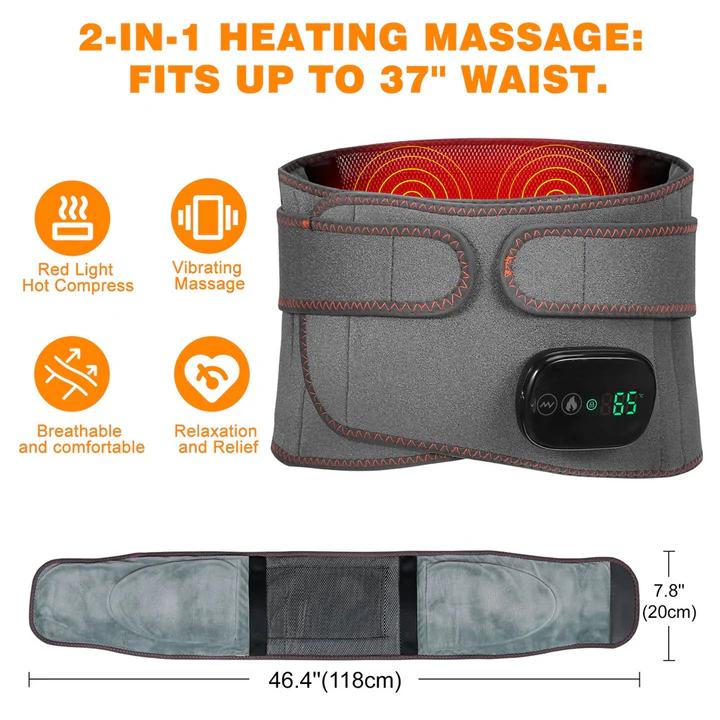Is Heat or Ice Better for Back Pain?

Back pain is a common medical condition that impacts millions of people globally. This type of pain is rather disturbing due to the significant discomfort and disruption in daily activities. Among the popular treatments recommended for alleviating back pain are heat and cold therapies.
Then, is heat or ice better for back pain? The ultimate answer depends upon your specific conditions. Several factors can affect the final choice that can be genuinely beneficial. This article will give you a clear idea of heat or ice therapy to treat back pain.

Is Heat Good for Back Pain?
In order to do a head-to-head comparison of whether heat or ice is better for back pain, it is essential to see both these methods in detail.
Heat therapy is a known method for providing several physiological benefits that eventually alleviate discomfort. Here's how it works and when it is the most feasible solution:
- How Heat Therapy Works
Dilation of the blood vessels is the major reason why heating therapy has such a soothing effect. As you heat your back, the blood flow to stiff areas increases and provides those muscles with the necessary oxygen and nutrients. It also promotes the removal of waste, metabolic byproducts, and chemicals that can cause inflammation. This way, your muscles will be relaxed.
- When to Apply Heat to Soothe Back Pain
There are some situations when heat is better than ice, like:
- Muscle Tension
- Spasms or Chronic Pain
- Recovery Period after Acute Pain
The applied heat can help relax the strained muscles by keeping them loose and flexible. Additionally, it speeds up the healing process by boosting the blood flow.
- How to Apply Heat to Back
There are many ways to effectively apply heat on the affected area, including:
- Hot Water Bottle: This is a perfect solution for low-budget heating therapy. It is also a portable solution and can be carried wherever you want.
- Heating Pad: Heating pads are efficient for providing consistent and even heat to your back. Premium heating pads are wireless, which makes them a highly portable choice. The best feature of these heating pads is the adjustable heat and vibration levels.
- Warm Bath: Sometimes, soaking yourself in a warm bath can be a beneficial way. While it helps in reducing back pain, it also relaxes your entire body.
Whichever method you choose, just take care of the heating temperature to avoid burns. While you may feel soothed by applying a lot of heat, an excessive amount can burn your skin, resulting in undesirable trouble.
Is Ice Good for Back Pain?
Now, let's talk about the use of ice therapy to tackle whether heat or ice is better for back pain.
Actually, cold therapy is a trusted method for managing certain types of back pain.
- How Ice/Cold Therapy Works
The primary action of ice therapy is the constriction of blood vessels in the targeted area. This constriction reduces blood flow, which ultimately decreases swelling and inflammation that contribute to pain. The cold feeling also has a numbing effect on nerve fibers and receptors, temporarily lessening the perception of pain.
- When to Apply Ice to Ease Back Pain
Ice therapy is highly effective in certain scenarios, like:
- Acute Back Pain (Minor Trauma): When experiencing sudden back pain due to a minor injury or strain, ice can help reduce inflammation and muscle spasms. The key is to apply the ice in the early stage, maybe within 2 days.
- Mild Sports Injuries: Cold therapy can be utilized as back strain treatment or back sprain treatment in sports activities. It helps decrease swelling and pain at the site of injury, promoting healing.
- Swelling: Cold application can quickly reduce swelling around joints or muscles, as it constricts blood vessels and limits the accumulation of fluid.
- Inflammation: For inflammatory back pain, cold helps limit the body's inflammatory response, which is often the root cause of the pain.
-
How to Apply Ice to Back
- Ice Pack: This is the most common household technique. Wrap the ice pack in a light cloth or towel before applying it to the sore area. Just make sure to use these ice packs for 15 to 20 minutes at a time to avoid any complications. If you want to DIY a homemade ice pack, consider wrapping a plastic bag filled with crushed ice.
- Cold Compress: A simple and quick cold solution involves a cloth soaked in cold water, wrung out, and then applied to the back. It is a highly economical method and can be done repeatedly.
It should be noted that the temperature should be moderate to avoid frostbite. Avoid placing ice directly on the skin or for too long at a time.
Precautions for Heat or Ice Application
Is heat or ice better for back pain? Now, you may have a relatively clear understanding. Before you apply any technique yourself, there are some conditions that require your further consideration:
- Skin Issues
Open wounds or skin-related issues should not be directly exposed to ice or heat. The contact with extreme temperatures can intensify skin issues and even cause infections in the wounds. If you are suffering from any such condition, it's time to visit a professional.
- Blood Circulation Problems
Individuals with blood circulation disorders, like those with Raynaud's phenomenon or peripheral artery disease, should be cautious with both heat and cold therapies. They may increase your suffering rather than give you the needed relief. Again, seek a professional's advice to ensure whether heat or ice is better for you.
- Reduced or Lost Sensation
People with reduced or lost sensation can find it difficult to perceive temperature changes, which could trigger burns or frostbite. In such cases, it is crucial to control the temperature carefully and regularly check the skin to prevent injury.
- Allergies to Hot/Cold
While this is not a common phenomenon, some people are hypersensitive to extreme temperatures, and their bodies show skin rashes, hives, or other symptoms when exposed to heat or cold. These people have to visit doctors before proceeding to avoid any complications.
How to Relieve Back Pain- Non-Drug Therapies
While heat and cold therapies are common approaches for alleviating back pain, there are various non-drug therapies like:
- Physical Therapy
Physical therapy, including personalized exercises for muscle strengthening and flexibility enhancement, is also beneficial to get rid of back pain. The important thing is to follow the schedule given by the physiotherapist for the best results.
- Massage
Massage therapy reduces muscle tension and spasms and increases blood flow in affected regions. This will lead to significant relief from pain and discomfort, especially for individuals who are dealing with stress-related tightness and chronic muscular pain.
- Acupuncture
This traditional Chinese technique of inserting needles in specific points helps restore the body's energy flow (qi) and stimulates the nervous system.
- Exercise and Workouts
Regular exercise and targeted workout routines can be helpful in reducing back pain, too. Exercises like yoga and Pilates, which concentrate on core strengthening and flexibility, have been shown to be beneficial for back health.
Try Fivali Back Brace for Back Pain
If heat therapy and massage are what you need, Fivali can provide the best solutions to alleviate your back pain. Two of them are:
1. Fivali Heating Pad for Back Pain, Massage Body and Alleviate Fatigue

This heating pad is perfect for daily use and provides your back with a highly soothing experience. You can adjust the massage intensity on its digital screen, which gives you the option to set temperature and vibration modes. It is a snug-fit design that is easily adjustable for a waist up to 35 inches.
2. Fivali Lower Back Brace with Infrared Heating Provides Back Pain Relief

With the availability of wireless features and long battery life, this is a highly portable heating back brace. It has three levels for both heating and vibration that can be adjusted from the digital screen. The set mode can be locked to avoid mistouches. Besides, the fabric used in its construction provides unparalleled relief due to its breathable nature.
Is heat or ice better for back pain? The answer varies. It relies on your specific conditions and can require professional guidelines. Sometimes, these two therapies cooperate with each other to achieve the best outcome.
If you are in need of a solution offering persistent heat or massage comfort, visit Fivali to check out our latest solutions for you. Hopefully, our back brace for back pain can ease your discomfort and promote a better recovery.
-
Posted in
Back pain causes, Brace, Pain, Recovery













